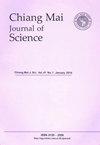开发基于数字比色法的硫脲受体,用于高灵敏度检测磷酸二氢盐
IF 0.6
4区 综合性期刊
Q3 MULTIDISCIPLINARY SCIENCES
引用次数: 0
摘要
本研究旨在合成一种新的化学传感器,即 1,1'-(1,4-亚苯基)双(3-(4-硝基苯基)硫脲),专门用于检测 H2PO4-。利用傅立叶变换红外光谱、液相色谱-质谱、1H NMR 和 13C NMR 对该化合物进行了表征,并通过各种分析对其比色传感能力进行了验证。这些分析包括线性度、检测限 (LOD)、定量限 (LOQ)、精确度和准确度(使用紫外可见分光光度法、RGB 和 HSV 颜色成分)。使用智能手机摄像头捕捉颜色变化的数字图像,并使用 Color Grab 应用程序对颜色成分进行量化。随后,在乙腈中进行了阴离子(NO3-、Cl-、HSO4- 和 H2PO4-)测试,加入 H2PO4- 后,颜色从无色明显变为黄色。结果表明,H2PO4- 的检测取决于溶液的 pH 值,在 pH 值为 1-3 时,由于阴离子转化为酸性物质,所以没有观察到颜色变化。在 pH 值为 5 时,检测到的 H2PO4- 呈黄色,碱性条件下则会产生不同的颜色反应。此外,UV-Vis 检测的恢复值为 99.80% 至 100.6%,表明准确度很高。基于 RGB 和 HSV 颜色成分的传感器的恢复值分别为 101.6% 至 114.4% 和 92.50% 至 110.2%。UV-Vis 法、RGB 法和 HSV 法的 LOD 值分别为 0.16 μM、0.46 μM 和 0.18 μM,LOQ 值分别为 0.54 μM、1.52 μM 和 0.61 μM。总之,利用紫外可见分光光度法和基于数字比色法的图像,合成的化学传感器具有准确灵敏地检测 H2PO4- 的潜力。本文章由计算机程序翻译,如有差异,请以英文原文为准。
The Development of Digital Colorimetric-Based Thiourea Receptor for Highly Sensitive Detection of Dihydrogen Phosphate
T his study aimed to synthesize a new chemosensor, namely 1,1’-(1,4-phenylene)bis(3-(4-nitrophenyl)thiourea), specifically designed for detection of H2PO4−. The compound was characterized using FTIR, LC-MS, 1H NMR, and 13C NMR, while the colorimetric sensing abilities were validated through various analyses. These include linearity, limit of detection (LOD), limit of quantification (LOQ), precision, and accuracy using UV-Vis spectrophotometry, RGB, and HSV color components. Digital images of color changes were captured using a smartphone camera and Color Grab app was used to quantify color components. Subsequently, anions test (NO3−, Cl–, HSO4−, and H2PO4−) were conducted in acetonitrile, where the addition of H2PO4− induced a distinct color change from colorless to yellow. The results showed that detection of H2PO4− depended on pH of the solution, with no color change observed at pH 1-3 due to anions converting to acidic species. At pH 5, H2PO4− was detected as a yellow color change, and alkaline conditions led to different color responses. Furthermore, UV-Vis detection showed recovery values of 99.80% to 100.6%, indicating high accuracy. RGB and HSV color component-based sensors showed recovery values of 101.6% to 114.4% and 92.50% to 110.2%, respectively. The LOD of the UV-Vis, RGB, and HSV methods were 0.16 μM, 0.46 μM, and 0.18 μM, while LOQ values were 0.54 μM,1.52 μM, and 0.61 μM, respectively. In conclusion, the synthesized chemosensor showed potential for accurate and sensitive detection of H2PO4− using UV-Vis spectrophotometry and digital colorimetric-based image.
求助全文
通过发布文献求助,成功后即可免费获取论文全文。
去求助
来源期刊

Chiang Mai Journal of Science
MULTIDISCIPLINARY SCIENCES-
CiteScore
1.00
自引率
25.00%
发文量
103
审稿时长
3 months
期刊介绍:
The Chiang Mai Journal of Science is an international English language peer-reviewed journal which is published in open access electronic format 6 times a year in January, March, May, July, September and November by the Faculty of Science, Chiang Mai University. Manuscripts in most areas of science are welcomed except in areas such as agriculture, engineering and medical science which are outside the scope of the Journal. Currently, we focus on manuscripts in biology, chemistry, physics, materials science and environmental science. Papers in mathematics statistics and computer science are also included but should be of an applied nature rather than purely theoretical. Manuscripts describing experiments on humans or animals are required to provide proof that all experiments have been carried out according to the ethical regulations of the respective institutional and/or governmental authorities and this should be clearly stated in the manuscript itself. The Editor reserves the right to reject manuscripts that fail to do so.
 求助内容:
求助内容: 应助结果提醒方式:
应助结果提醒方式:


